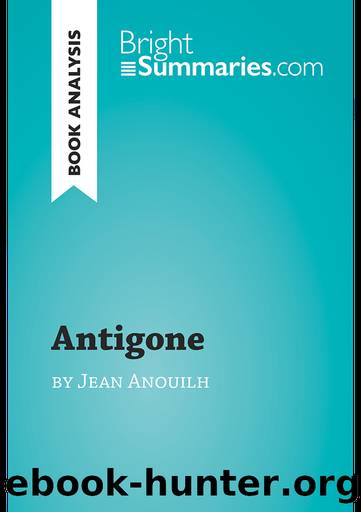Antigone by Jean Anouilh (Book Analysis) by Bright Summaries

Author:Bright Summaries
Language: eng
Format: epub
Publisher: BrightSummaries.com
Published: 2016-01-15T00:00:00+00:00
Ismene
In the prologue, Anouilh describes her as:
Physically, âblondâ, âbeautifulâ, âhappyâ and âsensualâ;
Morally, she âchats and laughsâ, âhas a âtaste for dance and gamesâ and a âtaste for happiness and successâ.
What is surprising in the prologue is that Ismene is the only character not to be presented individually. She is only mentioned in relation to Antigone and Haemon.
Thus, Ismene is a character who is defined by comparison, either through her affinities with Haemon, or in contrast to Antigone. In fact, everything is different about the two sisters, physically and morally. The reflection and prudence of the older sister clash with the passion and prudent audacity of the younger sister. The phrase âI somewhat understand our uncleâ said by Ismene, is followed by âI do not want to understand somewhatâ said by Antigone. When Ismene says âListen to me, Iâm right more often than youâ, Antigone responds by saying âI do not want to be rightâ, which shows her determination and stubbornness.
The two female characters of the play are, therefore, completely different. Ismene is a beautiful, sensual young woman looking for simple and material happiness, with a âtaste for dance and games [â¦] happiness and successâ. This type of happiness is specifically rejected by Antigone, with all her boyish determination.
The excerpt that is most revealing of Ismeneâs personality appears in her dialogue with Antigone. From the beginning of the conversation, Ismene reports twice that she has âthought it through wellâ before saying three times that she âthinksâ. This emphasis indicates that Ismene acts based on reason, unlike Antigone who is guided by her passion, but it may also indicate a lack of confidence since Ismene finds it necessary to state five times her âthinkingâ and to support this three times using the adverb âwellâ. Then, Ismene shows perfect mastery of dialectic by alternating logical and psychological arguments. Wanting to convince her sister of the absurdity of her gesture, she first tries to reason with her, then, when this has no effect, she changes her strategy by trying to speak to her heart. The construction of her speech is proof that she is a thoughtful person. We can also observe that Antigone never tries to disprove her sisterâs arguments, she only responds using negative sentences and thus refuses to enter into a real discussion.
Download
This site does not store any files on its server. We only index and link to content provided by other sites. Please contact the content providers to delete copyright contents if any and email us, we'll remove relevant links or contents immediately.
Cecilia; Or, Memoirs of an Heiress — Volume 2 by Fanny Burney(31936)
Cecilia; Or, Memoirs of an Heiress — Volume 3 by Fanny Burney(31928)
Dialogue by Robert McKee(4385)
The 101 Dalmatians by Dodie Smith(3504)
Bound by Hatred (The Singham Bloodlines Book 2) by MV Kasi(3066)
The Art of Dramatic Writing: Its Basis in the Creative Interpretation of Human Motives by Egri Lajos(3058)
Harry Potter and the Cursed Child - Parts One and Two by John Tiffany(3027)
The Beautiful Boys: A High School NA Reverse Harem Paranormal Bully Romance (Shadowlight Academy Book 1) by Gow Kailin(2855)
Angels in America by Tony Kushner(2648)
Carrie's War by Nina Bawden(2463)
A Clockwork Orange by Anthony Burgess(2458)
Unlaced by Jaci Burton & Jasmine Haynes & Joey W. Hill & Denise Rossetti(2360)
The Femme Playlist & I Cannot Lie to the Stars That Made Me by Catherine Hernandez(2280)
Open Book by Jessica Simpson(2259)
Drama by John Lithgow(2230)
Outside Woman (BWWM Amish Romance) by Stacy-Deanne(2105)
Terrorist Cop by Mordecai Dzikansky & ROBERT SLATER(2069)
Yerma by Federico García Lorca(2062)
Leo's Desire by Sundari Venkatraman(1929)
